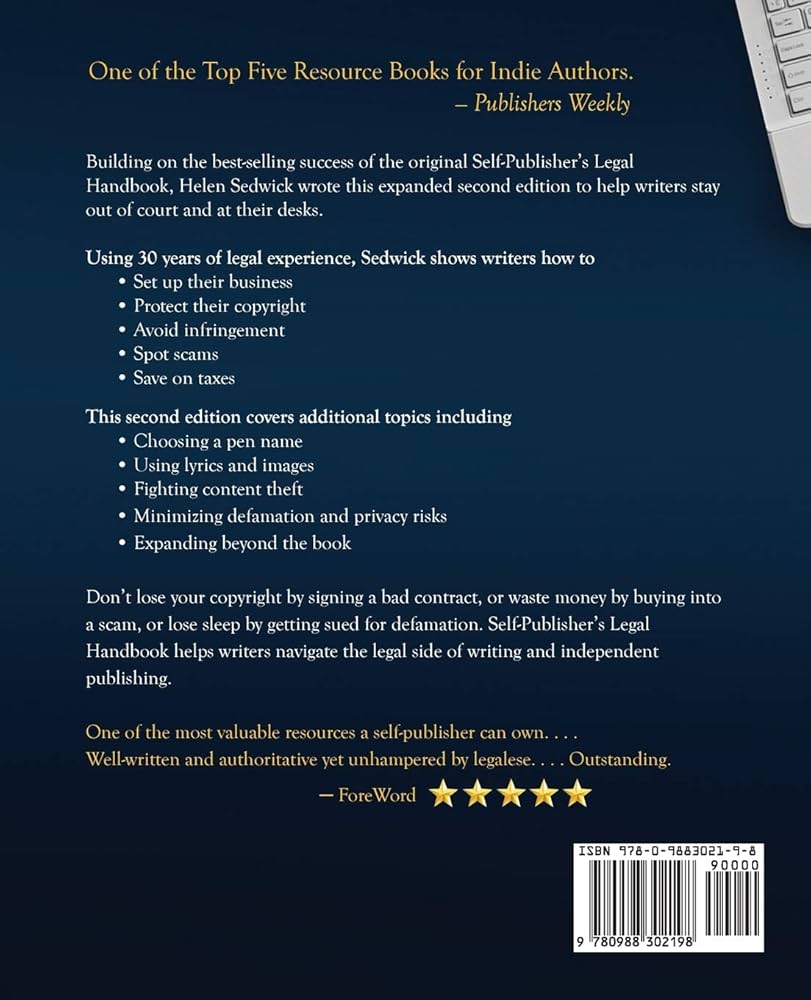Are you thinking about publishing your own book but wondering if self-publishing is a bad idea? You’re not alone.
Many writers worry about the risks, the quality, and whether their work will be taken seriously. What if self-publishing could actually be your best move? You’ll discover the truth behind common fears and myths. By the end, you’ll know exactly if self-publishing is right for you—and how to make it work in your favor.
Keep reading to unlock the full picture.

Credit: www.amazon.com
Common Myths About Self Publishing
Self publishing often faces many wrong ideas. These myths can stop writers from trying. Knowing the truth helps authors make smart choices. Let’s clear up some common myths about self publishing.
Is Self Publishing Only For Failed Authors?
Many think self publishing means rejection by big publishers. This is not true. Many successful writers choose self publishing first. It offers control over the book and sales. No need to wait for approval from others.
Self Published Books Are Low Quality
Some believe self published books lack good editing or design. Today, many authors hire experts to polish their work. Readers find many well-made books from self publishing. Quality depends on the author, not the publishing path.
Self Publishing Does Not Lead To Real Success
Success stories exist in both traditional and self publishing. Many self published authors earn good money and build a fan base. Success depends on effort, marketing, and writing skills. The method of publishing is just one part.
Self Publishing Is Too Expensive
Costs vary, but self publishing can fit many budgets. Authors can start small and grow over time. No need to spend a lot upfront. Many free tools and affordable services help produce a book.
Only Big Publishers Can Market Books Well
Authors can learn to market their own books. Social media and online platforms make it easier to reach readers. Many self published authors build strong marketing skills. Marketing success depends on strategy, not publisher size.
Quality Concerns And How They Are Addressed
Quality concerns often arise with self-publishing. Many readers wonder if self-published books meet the standards of traditional publishing. Some worry about poor editing, weak storylines, and bad design. These concerns are real but not always true. Self-publishing has improved greatly. Many authors take steps to ensure high quality in their work.
Authors now use professional services to improve their books. Editors, cover designers, and formatters help create polished final products. The rise of online platforms also offers tools for better quality control. Self-published books can be as good as those from big publishers.
Professional Editing Services
Many self-published authors hire professional editors. Editors check grammar, spelling, and story flow. They help fix mistakes and improve readability. This process raises the book’s quality to a professional level. It prevents common errors that turn readers away.
Cover Design And Formatting
A book’s cover is the first thing readers see. Good cover design attracts attention and shows quality. Self-published authors often hire designers for eye-catching covers. Proper formatting ensures the book looks good on all devices. These steps make reading easier and more enjoyable.
Reader Reviews And Feedback
Reader reviews help maintain quality in self-published books. Honest feedback points out strengths and weaknesses. Authors use this feedback to improve their work. Reviews also guide new readers on book quality. This creates a community that supports better writing.
Financial Realities Of Self Publishing
Self publishing seems easy and cheap at first. Many believe it costs nothing but time. The truth is different. Authors must pay for editing, cover design, and marketing. These costs add up fast.
Authors keep more profit per book than with traditional publishing. Still, selling many books is hard. Without a big audience, earnings stay low. Understanding these financial facts helps avoid surprises.
Upfront Costs In Self Publishing
Self publishing requires money before sales begin. Editing is essential for good quality. A professional cover attracts readers and costs money. Formatting the book for different devices takes time or payment. Marketing expenses include ads and promotions.
Royalties And Earnings
Self-published authors earn higher royalties than traditional ones. They get about 60-70% of the sale price. Traditional authors receive around 10-15%. More control means more profit per sale. But sales volume often stays low for new authors.
Marketing And Promotion Costs
Marketing is vital to sell books. Without it, even good books stay unseen. Ads on social media or book sites cost money. Hiring a publicist or running giveaways adds expenses. Authors must budget for ongoing promotion efforts.
Time Investment Equals Money
Self publishing takes a lot of time. Writing, editing, designing, and marketing demand hours. Time spent means less time earning elsewhere. Treat time as a real financial cost. Many authors underestimate this factor.
Creative Control And Author Freedom
Creative control and author freedom are key benefits of self-publishing. Authors keep full power over their work. They decide everything from the story to the cover design.
This freedom lets writers express their true vision. No one can change the plot or style without permission. Self-publishing removes many limits traditional publishers place on authors.
Authors can choose how to publish and sell their books. They set their own prices and marketing plans. The process feels more personal and direct.
Complete Control Over Content
Self-publishing means authors control every word. There is no editor forcing big changes. Writers keep their unique voice and style intact.
This control helps maintain the original message. Authors can write about topics that interest them most. They avoid censorship or unwanted edits.
Freedom To Design And Format
Authors decide how their book looks. They pick fonts, layouts, and cover art. This creates a strong personal brand.
Design choices can match the story’s mood. Writers can be creative beyond just the text. This control creates a better reading experience.
Flexible Publishing And Marketing
Self-publishing allows authors to choose release dates. They control pricing and discounts too. This flexibility helps reach readers faster.
Authors can try new marketing ideas without approval. They can build direct relationships with fans. This freedom supports growing an author’s career.
Marketing Challenges And Strategies
Marketing is one of the biggest challenges in self-publishing. Authors must find ways to reach readers and sell their books. Without a publisher’s support, all marketing efforts fall on the author’s shoulders. This means learning new skills and dedicating time to promotion. Success depends on smart strategies and consistent work.
Understanding The Target Audience
Knowing who will read the book is vital. Authors should think about age, interests, and reading habits. This helps choose the right marketing channels. Ads, social media, and book clubs all work better with a clear audience in mind.
Using Social Media Effectively
Social media offers a free way to connect with readers. Posting regularly keeps the audience engaged. Sharing behind-the-scenes stories or book updates builds interest. Simple posts can create strong connections over time.
Building An Author Platform
Having a website or blog helps authors appear professional. It gives readers a place to learn more about the author and books. Email newsletters can keep fans informed about new releases and events.
Seeking Reviews And Feedback
Reviews increase book credibility and attract buyers. Authors should ask readers to leave honest reviews. Positive feedback on sites like Amazon or Goodreads boosts visibility. Responding politely to reviews shows professionalism.
Running Paid Advertising Campaigns
Paid ads can increase book sales quickly. Platforms like Facebook and Amazon offer targeted ads. Small budgets can still reach specific reader groups. Monitoring ad performance helps improve results over time.
Success Stories From Self Published Authors
Self-publishing has helped many authors reach success without traditional publishers. These authors prove that self-publishing can be a good path. Their stories show how hard work and smart choices lead to results.
Many self-published authors have sold thousands of books. Some have even made writing their full-time job. Their journeys inspire new writers to try self-publishing with hope and confidence.
Andy Weir’s Journey To Bestseller
Andy Weir wrote “The Martian” and shared it online for free. Readers loved his story about surviving on Mars. The book became so popular that a publisher took interest. It later turned into a hit movie. His success started with self-publishing.
Hugh Howey’s Wool Series
Hugh Howey self-published his Wool series as ebooks. Readers enjoyed the unique world and story. Word spread fast, boosting sales. A major publisher bought the rights. Howey kept control over his work and profits.
Amanda Hocking’s Rise To Fame
Amanda Hocking self-published her fantasy books online. She sold over a million copies through digital platforms. Her success led to a big publishing deal. Hocking’s story shows how self-publishing can open doors.
Choosing Between Traditional And Self Publishing
Choosing between traditional and self publishing is a big decision for writers. Both paths have clear pros and cons. Understanding these can help you pick the best route for your book.
Traditional publishing means working with a publisher who handles editing, design, and distribution. Self publishing gives you full control but more responsibility. Your goals and resources will shape this choice.
What Traditional Publishing Offers
Traditional publishers manage most of the work for you. They edit your book and design a professional cover. They also handle printing and distribution to bookstores.
They offer credibility, making it easier to reach readers. Marketing support often comes with a publishing deal. But getting accepted is tough. The process can take a long time.
What Self Publishing Involves
Self publishing lets you publish your book on your own terms. You control the content, cover, and pricing. You can publish quickly without waiting for approval.
All costs fall on you, including editing and marketing. You keep most of the profits but must work hard to promote your book. Self publishing suits authors who want full control.
Choosing Based On Your Goals
Think about your main goal. Do you want wide distribution and support? Traditional publishing might fit best. Want fast publication and control? Self publishing may work better.
Consider your budget and time. Traditional publishing often pays you later. Self publishing requires upfront costs. Choose the path that matches your needs and skills.

Credit: discover.hubpages.com

Credit: tallulahlucy.com
Frequently Asked Questions
What Are The Main Drawbacks Of Self Publishing?
Self publishing may lack professional editing and marketing support. It can be costly and time-consuming.
Is Self Publishing Less Credible Than Traditional Publishing?
Self published books can be credible but often face bias from some readers and reviewers.
How Does Self Publishing Affect Book Sales Potential?
Sales depend on the author’s marketing efforts and book quality, not just the publishing method.
Can Self Publishing Limit Book Distribution Channels?
Yes, self published books may have fewer options in bookstores and libraries than traditionally published books.
What Are The Common Challenges Authors Face In Self Publishing?
Authors handle editing, design, marketing, and distribution alone, which can be difficult and stressful.
Does Self Publishing Impact An Author’s Long-term Career?
It can help build a career but may require extra work to gain recognition and trust.
How Does Self Publishing Influence Creative Control?
Authors keep full control over content, design, and rights without outside interference.
Conclusion
Self-publishing is not bad by itself. It offers freedom to many writers. You control your book and its path. Success depends on effort and learning. Challenges exist, but they teach valuable lessons. Many authors find joy in self-publishing. It can be a good choice for some.
Think about your goals and skills first. Then decide if self-publishing fits you. The key: stay patient and keep improving. Your story deserves to be told.